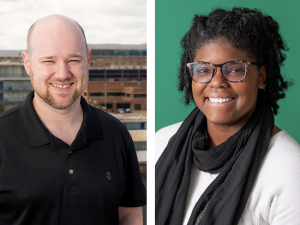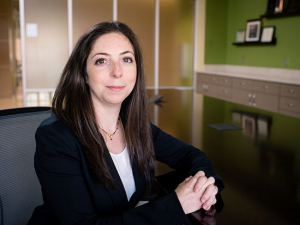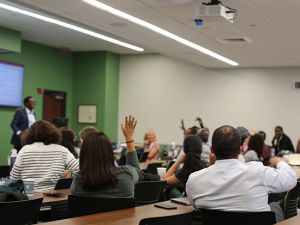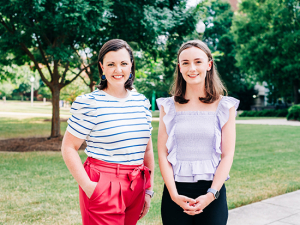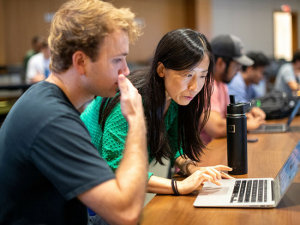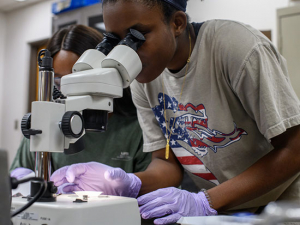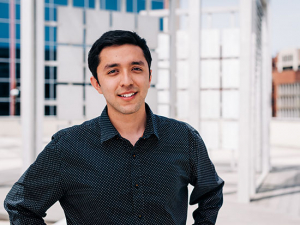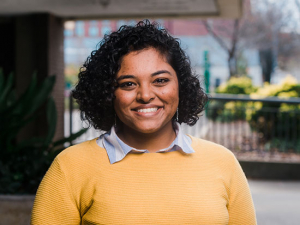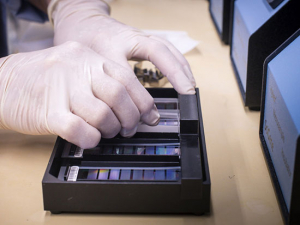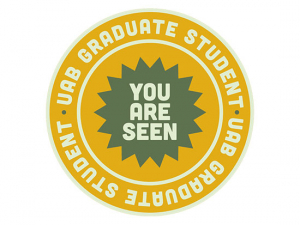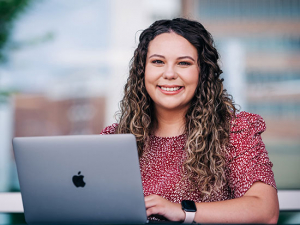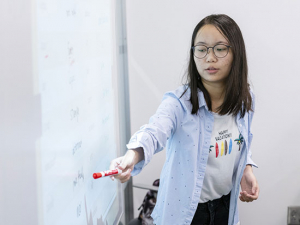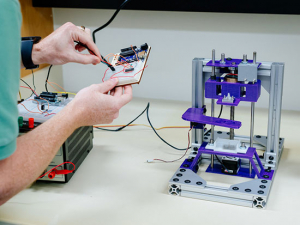 Expanding businesses in Birmingham such as Shipt are looking for workers to fill hybrid jobs that combine multiple skillsets — coding plus leadership training, for example. The Graduate School's new master's programs allow students to create their own graduate degree by combining two participating UAB certificate programs and a capstone course.What did you want to be when you grew up?
Expanding businesses in Birmingham such as Shipt are looking for workers to fill hybrid jobs that combine multiple skillsets — coding plus leadership training, for example. The Graduate School's new master's programs allow students to create their own graduate degree by combining two participating UAB certificate programs and a capstone course.What did you want to be when you grew up?
In her role as assistant director of the UAB Career Center, Britney Blackstock often asks students and employees to reflect on that question. The point is to "illustrate that life often involves exploration, and sometimes pivots happen," said Blackstock, who engages with faculty, staff and 3,000-plus students in the schools of Nursing and Education, undeclared populations and social-sciences majors within the College of Arts and Sciences.
Blackstock recently made her own pivot through a new program in the Graduate School. The Interdisciplinary Graduate Studies (IGS) master’s program, which launched in fall 2020, allows students to combine two participating UAB certificate programs with a capstone project involving experiential learning “to gain knowledge and skills they want as they seek professional advancement or personal development,” according to the program’s website. Blackstock’s take: “The IGS option is perfect for me.”
‘Nimble and well-trained workforce’
For several years, there has been a national conversation among thought leaders in higher education “around the concepts of ‘stackable certificates’ and ‘micro-credentials,’” said Graduate School Dean Lori McMahon, Ph.D. The edX platform of massive open online courses, or MOOCs, and “micromasters” programs created by Harvard University and the Massachusetts Institute of Technology, are notable examples that give students the opportunity to “stack” education together to form a master’s degree, McMahon said.
| For several years, there has been a national conversation among thought leaders in higher education “around the concepts of stackable certificates and micro-credentials,” said Graduate School Dean Lori McMahon, Ph.D. The edX platform of massive open online courses, or MOOCs, and “micromasters” programs created by Harvard University and the Massachusetts Institute of Technology, are notable examples that give students the opportunity to “stack” education together to form a master’s degree. |
These efforts are related to the larger workforce shift to hybrid jobs — positions, often related to technology, that don’t neatly match the skillsets taught by any particular educational field. McMahon’s interest had been sparked by initiatives like edX, and an effort by the greater Birmingham region to shift its workforce to better match current and future employment trends brought the catalyst for action. Several years ago, leaders in a seven-county region commissioned an economic development report and labor market analysis from Burning Glass Technologies and the Council for Adult and Experiential Learning.
Released in June 2018, the report focused on ways Birmingham could build a "talent roadmap” to future growth. It emphasized that existing employers reported a need for "more management talent.... with a particular focus on employees with 5-10 years' experience and an ability to lead small teams." It also noted that, now and in the future, more jobs will become hybrids that blur former professional boundaries, “with technical skills such as coding and data analysis moving into otherwise non-technical roles.”
When McMahon and Lisa Kerr, Ed.D., director of Community Outreach and Engagement in the Graduate School, have conversations with Shipt and other major Birmingham employers, they hear a similar message. "They aren't necessarily looking for employees with traditional master's degrees," Kerr said. "They need employees with specific computer skills and training in leadership."
| Now and in the future, more jobs will become hybrids that blur former professional boundaries, “with technical skills such as coding and data analysis moving into otherwise non-technical roles,” according to the Burning Glass report. "They aren't necessarily looking for employees with traditional master's degrees. They need employees with specific computer skills and training in leadership," said Lisa Kerr, Ph.D., director of Community Outreach and Engagement in the Graduate School |
The Burning Glass report has shifted these discussions into a higher gear, Kerr said. One of the Graduate School’s first steps was to launch a Leadership and Professional Development certificate program. But "existing companies, and our entire regional workforce development effort, needs employees trained for these hybrid jobs as well — jobs that combine two or more skills that were formerly separated,” Kerr added. “That’s how you can generate a person who has the diverse skillsets needed for these hybrid jobs — with stackable certificates,” McMahon said.
The new IGS degrees (Master of Arts and Master of Science options are available) can help fill in training gaps for these specialized skills so workers can meet the needs of these hybrid positions. This is the first such program offered in Alabama, McMahon noted.
"These are professional practitioner-based degrees that include two qualifying certificates plus a capstone dedicated to experiential learning," Kerr said. "Certificates generally do not include the research components that are part of a master's degree program. The master's component here comes in being able to read, articulate and apply research and understand the research process, but students won’t have to conduct their own original research for the IGS degree. That opens the door for a lot of people."
‘This would be amazing’
The IGS degrees already have attracted strong interest from UAB employees, students and potential students, Kerr said. "As we were in the process of developing the program, we heard from employers and learners who said, 'Yes, this would be amazing,'" she said. Now that the program is open, Kerr said, "I literally had at least one email each week in the fall semester from potential students out of state and internationally, including queries from Cairo and Dubai."
When she talks to these potential students, "I ask, Are you a practitioner who loves what you are doing and wants to learn a skill, or are you seeking advancement to a new career?” Kerr said. “If so, this might be for you."
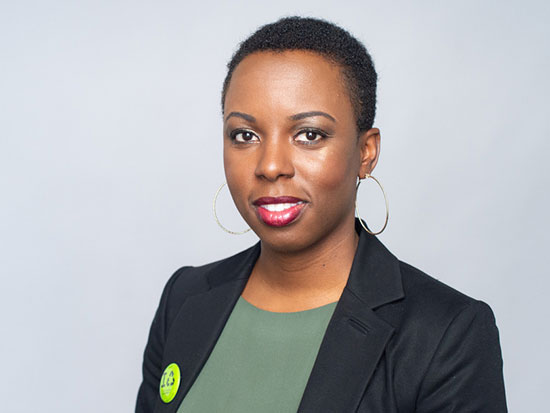 Shantay Williams, a program manager in the School of Nursing, is pursuing certificates in social media and leadership and development. "I consider myself a lifelong learner — I love learning and sharpening my skills," she said.Britney Blackstock first heard about IGS as she was experiencing what she calls a "personal crisis." She had been studying toward a master's degree in counseling, with an emphasis on school counseling, but had come to a realization that it "wasn't meant to be," she said. She met with Kerr and learned about IGS, which "would afford me an opportunity to continue pursuing a long sought-after degree," Blackstock said. She is now pursuing certificates in Leadership and Professional Development from the Graduate School and Higher Education Administration from the School of Education. "The IGS option is perfect for me because it is customizable based on my professional interests," she said. "Both of these options are suitable to expound upon my current interests and experiences with full potential for growth in higher education."
Shantay Williams, a program manager in the School of Nursing, is pursuing certificates in social media and leadership and development. "I consider myself a lifelong learner — I love learning and sharpening my skills," she said.Britney Blackstock first heard about IGS as she was experiencing what she calls a "personal crisis." She had been studying toward a master's degree in counseling, with an emphasis on school counseling, but had come to a realization that it "wasn't meant to be," she said. She met with Kerr and learned about IGS, which "would afford me an opportunity to continue pursuing a long sought-after degree," Blackstock said. She is now pursuing certificates in Leadership and Professional Development from the Graduate School and Higher Education Administration from the School of Education. "The IGS option is perfect for me because it is customizable based on my professional interests," she said. "Both of these options are suitable to expound upon my current interests and experiences with full potential for growth in higher education."
Shantay Williams is another employee who is excited about the IGS program. Williams is a program manager in the dean's office at the School of Nursing, where she is responsible for maintaining and reporting compliance data for accreditation purposes, managing timekeeping processes and processing financial documents. She is pursuing a certificate in Social Media in the Collat School of Business and the Leadership and Development certificate in the Graduate School. "I consider myself a lifelong learner — I love learning and sharpening my skills," Williams said. "I was interested in the social media certificate because it seemed not only marketable but also informative."
Based on the initial semester of experience, "I don't have a lot of hard data to say whether there are any trends, but there are a lot of students in the health area," Kerr said. For example, "we have nurses who don't want to do a master's in nursing but want to gain leadership skills or want to be able to be health coaches.” And new certificates continue to come online from schools across campus, so the options are always expanding, she added.
Many of these students are UAB employees, Kerr said. "I think as these options continue to grow, we will see more and more UAB employees benefitting from these degrees and I think the institution will benefit from having the practical skills and the training they need for their jobs. If an academic advisor wants to become exceptional in that role, for example, they could take a certificate in student development theory and in academic advising; those are skills and competencies they need.
| "The IGS option is perfect for me because it is customizable based on my professional interests. Both of these options are suitable to expound upon my current interests and experiences with full potential for growth in higher education." |
"Another group of folks who I am hearing from are those in retirement who want to transition to a new area," Kerr said. "They will say, 'If I am going to transition to a new career, I will need specialized skills in social media,' for example. I think this is going to provide opportunities for the economy throughout the state."
How to apply
The requirements for the IGS degrees are admission to the Graduate School and then admission to both of the certificate programs a student intends to pursue before the student can be admitted to the MS or MA in interdisciplinary studies, Kerr said. Students must have earned a bachelor's degree with a 2.5 or higher GPA; certificates do not typically require the GRE and the MAT exam.
"Once they are admitted to the IGS program, they are required to meet with me or someone in the program to create a curriculum map or degree map they will follow," Kerr said. That includes the goals the learner has to get out of the degree. "Those can be personal or professional goals, but there has to be a rationale," Kerr said.
Those who have completed two UAB certificates (that are affiliated with the IGS program, see list below) in the past five years can apply them toward the IGS master's, Kerr noted. "All you have to do is apply to the program and complete the capstone," she said.
"If you want to open a vineyard, I don't know if the IGS degree at UAB can help," Kerr said. "But if you have always thought about opening your own nonprofit to support disadvantaged youth in areas with food deserts, for example, we can look at the nonprofit management certificate combined with the nutrition certificate. I recommend that students interested in the program look at our certificates and see if those are courses that interest them."
